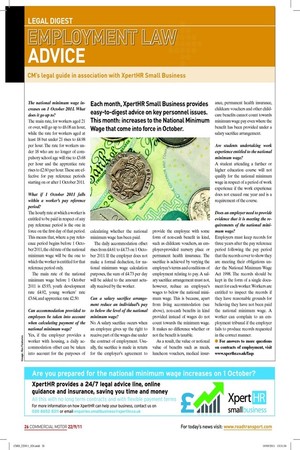Each month, XpertHR Small Business provides easy-to-digest advice on key
Page 16

If you've noticed an error in this article please click here to report it so we can fix it.
personnel issues. This month: increases to the National Minimum Wage that come into force in October.
The national minimum wage increases on 1 October 2011. What does it go up to?
The main rate, for workers aged 21 or over, will go up to £6.08 an hour, while the rate for workers aged at least 18 but under 21 rises to £4.98 per hour. The rate for workers under 18 who are no longer of compulsory school age will rise to £3.68 per hour and the apprentice rate rises to £2.60 per hour. These are effective for pay reference periods starting on or after 1 October 2011.
What if 1 October 2011 falls within a worker’s pay reference period?
The hourly rate at which a worker is entitled to be paid in respect of any pay reference period is the one in force on the irst day of that period. This means that, where a pay reference period begins before 1 October 2011, the old rate of the national minimum wage will be the one to which the worker is entitled for that reference period only.
The main rate of the national minimum wage before 1 October 2011 is £5.93, youth development rate £4.92, young workers’ rate £3.64, and apprentice rate £2.50.
Can accommodation provided to employees be taken into account when calculating payment of the national minimum wage?
Yes, if the employer provides a worker with housing, a daily accommodation offset can be taken into account for the purposes of calculating whether the national minimum wage has been paid.
The daily accommodation offset rises from £4.61 to £4.73 on 1 October 2011. If the employer does not make a formal deduction, for national minimum wage calculation purposes, the sum of £4.73 per day will be added to the amount actually received by the worker.
Can a salary sacri�ce arrangement reduce an individual’s pay to below the level of the national minimum wage?
No. A salary sacriice occurs when an employee gives up the right to receive part of the wages due under the contract of employment. Usually, the sacriice is made in return for the employer’s agreement to provide the employee with some form of non-cash beneit in kind, such as childcare vouchers, an employer-provided nursery place or permanent health insurance. The sacriice is achieved by varying the employee’s terms and conditions of employment relating to pay. A salary sacriice arrangement must not, however, reduce an employee’s wages to below the national minimum wage. This is because, apart from living accommodation (see above), non-cash beneits in kind provided instead of wages do not count towards the minimum wage. It makes no difference whether or not the beneit is taxable.
As a result, the value or notional value of beneits such as meals, luncheon vouchers, medical insur ance, permanent health insurance, childcare vouchers and other childcare beneits cannot count towards minimum wage pay even where the beneit has been provided under a salary sacriice arrangement.
Are students undertaking work experience entitled to the national minimum wage?
A student attending a further or higher education course will not qualify for the national minimum wage in respect of a period of work experience if the work experience does not exceed one year and is a requirement of the course.
Does an employer need to provide evidence that it is meeting the requirements of the national minimum wage?
Employers must keep records for three years after the pay reference period following the pay period that the records cover to show they are meeting their obligations under the National Minimum Wage Act 1998. The records should be kept in the form of a single document for each worker. Workers are entitled to inspect the records if they have reasonable grounds for believing they have not been paid the national minimum wage. A worker can complain to an employment tribunal if the employer fails to produce records requested in the correct manner.
● For answers to more questions on contracts of employment, visit www.xperthr.co.uk/faqs




































